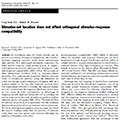Abstract
In two-choice tasks for which stimuli and responses vary along orthogonal dimensions, one stimulus-response mapping typically yields better performance than another. For unimanual movement responses, the hand used to respond, hand posture (prone or supine), and response eccentricity influence this orthogonal stimulus-response compatibility (SRC) effect. All accounts of these phenomena attribute them to response-related processes. Two experiments examined whether manipulation of stimulus-set position along the dimension on which the stimuli varied influences orthogonal SRC in a manner similar to the way that response location does. The experiments differed in whether the stimulus dimension was vertical and the response dimension horizontal, or vice versa. In both experiments, an advantage of mapping up with right and down with left was evident for several response modes, and stimulus-set position had no influence on the orthogonal SRC effect. The lack of effect of stimulus-set position is in agreement with the emphasis that present accounts place on response-related processes. We favor a multiple asymmetric codes account, for which the present findings imply that the polarity of stimulus codes does not vary across task contexts although the polarity of response codes does.
